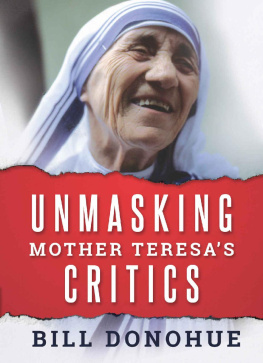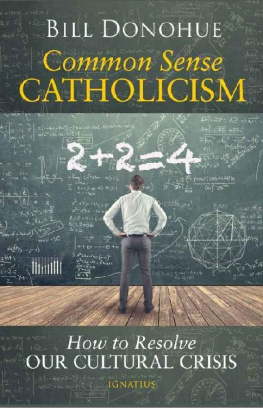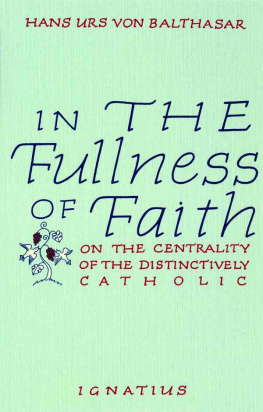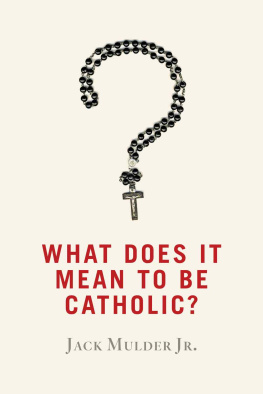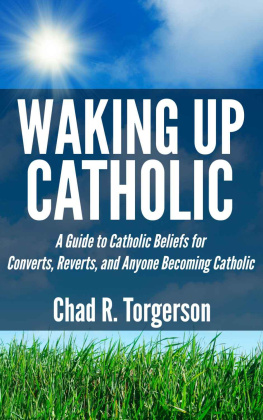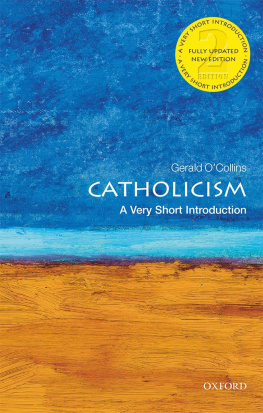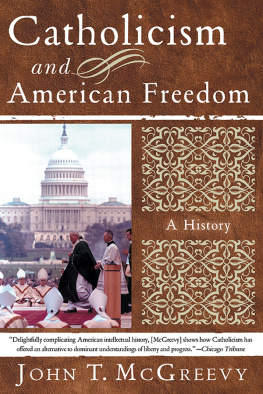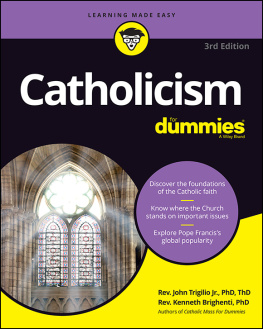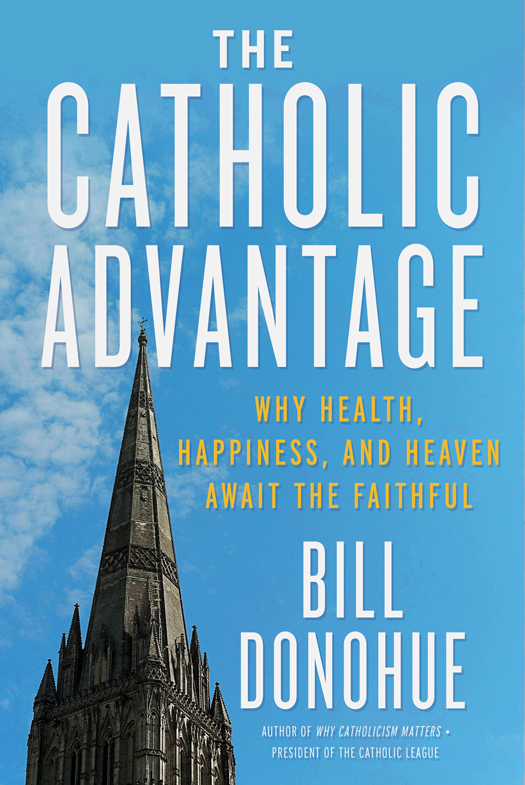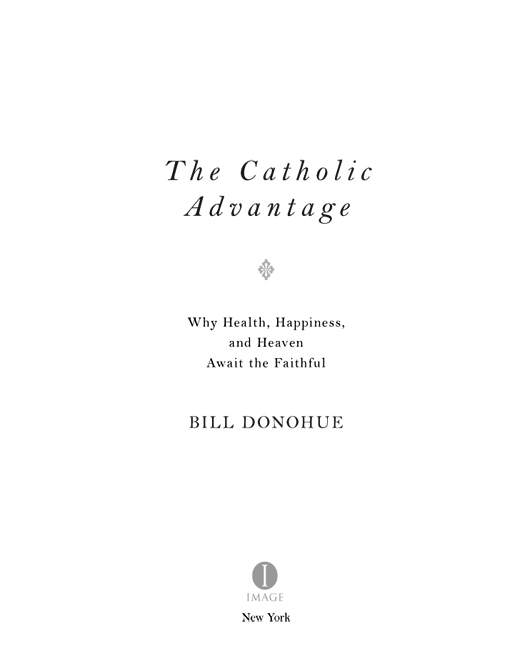Copyright 2015 by Dr. William Donohue
All rights reserved.
Published in the United States by Image, an imprint of the Crown Publishing Group, a division of Random House LLC, a Penguin Random House Company, New York.
www.crownpublishing.com
IMAGE is a registered trademark and the I colophon is a trademark of Random House LLC.
Library of Congress Cataloging-in-Publication Data is available upon request.
ISBN 978-0-8041-8582-0
eBook ISBN 978-0-8041-8584-4
Jacket photographs by Getty Images
v3.1
For Monsignor John G. Woolsey
Contents
Introduction
The Rewards of Catholicism
IN HIS APOSTOLIC EXHORTATION THE Joy of the Gospel, Pope Francis beckoned Catholics to proudly bring the good news of Catholicism to as many who will listen. He did not call upon Catholics to be callous salesmen, or to triumphantly wear their religion on their sleeves; rather, he asked them to challenge the secularist rationalism and the radical individualism that it entails. To be successful, we must provide an alternative, and there is no better tonic for our age than the good news that Catholicism offers. That is why the Holy Father exhorted us not to allow the Church to be reduced to the sphere of the private and the personal. He wants a public, full-throated exercise of religion. There is much to Catholicism that needs to be trumpeted.
The greatest joy that Catholicism offers is the prospect of achieving salvation; its teachings provide a veritable road map to heaven. There are other benefits, as well, residual rewards such as good health and happiness. All total, Catholicism offers the best guide to achieving health, happiness, and heaven.
Americans who are the most religious have the highest wellbeing (his emphasis). That is the principal conclusion that Gallup editor in chief Frank Newport came to in his book God Is Alive and Well. He is not alone in this finding. Importantly, not only are the most religious the most likely to be healthy and happy; there is an impressive body of research on priests and nuns, particularly on cloistered nuns, that shows just how true this finding is. While much of the data on religion and well-being are true for those across religions, and are not unique to Catholics, this book focuses on the ways Catholicism impacts well-being.
It is not as though the clergy and the religious steer their lives to achieve health and happinesstheir mission, and their actions, are oriented toward serving God and serving those in needbut there are certain positive by-products to their efforts. And when it comes to reaching heaven, even atheists will concede that altruistic behaviors and charitable giving are promising signs; very religious people, studies show, are the most likely to be altruistic and charitable.
It is not hard to come by evidence that shows religion to be integrally tied to well-being and self-giving, but attempts to explain why are sorely lacking. The purpose of this book is to examine what I call the Three Bs of Catholicismbeliefs, boundaries, and bondswhich in turn leads to achieving the Three Hshealth, happiness, and heaven. Its central contention is profoundly countercultural: It is not the abandonment of constraint that liberates; it is its rational embrace. What we get in returnit is quite a dividendis the greater likelihood of realizing the Three Hs. By contrast, the dominant culture, which is increasingly materialistic, casts limitations on behavior as being suspect at best, and nefarious at worst. What that vision yields, however, is not at all endearing. The evidence is decisive: when it comes to the attainment of health, happiness, and heaven, there is a clear Catholic advantage.
Many religions, Newport writes, either explicitly or implicitly promote norms of behavior that are in turn associated with higher wellbeing and healthy behaviors. Newport and I are both sociologists, so when we refer to higher wellbeing we are speaking about an overall sense of satisfaction that people have with their lives; we are not talking about some Platonic state. The term healthy behaviors refers to conduct that is associated with living longer, and to lifestyle choices that are not destructive to our physical or mental condition.
Beliefs and bonds are tied to these outcomes, but it is the role of boundaries that matters most in this regard: those who see boundaries as stifling are more likely to engage in risky behaviors, making for unhealthy and unhappy outcomes. Those who greet every limitation on their freedom as an unfair burden are the most likely to break normsthe rules of society that are commonly agreed to as a condition of civility. This is as unhealthy for the individual as it is destructive to society. For example, whether the behavior is driving too fast, or taking drugs, the social price tag is high. Fortunately, our Judeo-Christian heritage has many resources to draw on; the wisdom inherent in the Ten Commandments, for instance, cannot be surpassed. Add to this the bountiful resources that Catholicism has to offerit has explicit teachings on the necessity of maintaining boundariesand the result is a veritable guide to good living.
Those who are not religious have never been able to find a secular counterpart to the role religion plays in dealing with adversity. There is a reason why the old adage There is no such thing as an atheist in a foxhole is commonly cited: there is much truth to it. Of course, even the faithful have been known to surge toward God when they are crying out for help, so this phenomenon is hardly unique to nonbelievers. But at least believers have something palpable to repair to when crisis strikes.
Active participation in a religious community provides individuals with friends, fellow worshippers, social networks, and social support, Newport writes. This explanation shows the importance of bonds. Another ancient proverb, No man is an island, carries great truth: God did not mean for us to be alone. The physical and mental benefits that accrue from enmeshing ourselves in communities are formidable. Religious communities, more than others, provide a steady and reliable network of social relationships that its participants can draw onthey act as a buffer to adversity. In this regard, the communal appeal of Catholicism is central. It is indeed illustrative of the fact that bonds matter: they matter especially for the achievement of health and happiness.
Those who are religious vary considerably in the intensity of their convictions; they range from the serious-minded to the lukewarm. At the other end of the spectrum are agnostics and atheists. Agnostics are not certain whether God exists; atheists are sure he doesnt. Then there are those who do not practice any religion, but who nonetheless fail to identify with agnostics or atheists.
While there are important differences between these three sectors, they all share a secular vision: they believe that the best society is one that strongly limits the role of religion. By definition, they are the least likely to embrace the first of the Three Bs, namely beliefs. Less obvious is their comparatively weak commitment to bonds and boundaries. This will be explained in detail; it has much to do with their penchant for individualism. Consequently, as we shall see, they are also the least likely to achieve the Three Hs.
Therefore, two models will be presented: the Catholic vision and the secular vision. But we need to illustrate these models with personal examples. The examples chosen reflect ideal types. The great sociologist Max Weber devised this methodological tool so that comparisons could be made. By ideal he did not mean the best; he simply meant that the subject matter under discussion would be presented in its purest, and most accentuated, form. It is with this understanding that saints, priests, and nuns are being presented as the Catholic model. This does not mean that all the saints were walking pillars of purity; many were just the opposite in their early years. Nor does it mean that all priests and nuns have successfully embodied the teachings of Christ. It simply means that as a whole, when compared to other segments of society, they are a useful index of Catholicism in practice.


